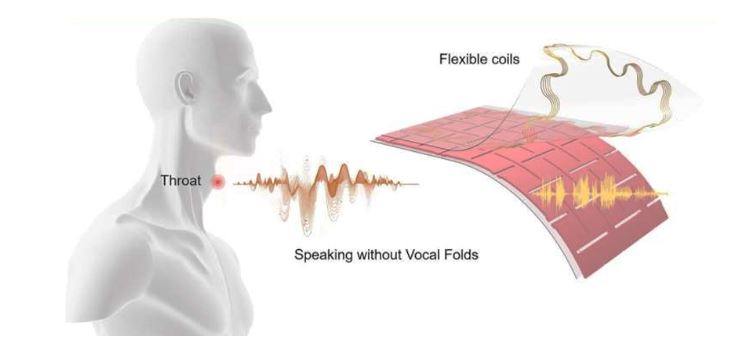


 10:0:9
10:0:9  2024-03-16
2024-03-16  1306
1306

A new adhesive patch could one day help people with voice disorders speak again by using artificial intelligence to read the movements of their throat muscles and turn them into speech, researchers said Tuesday.
The small, stretchy patch is powered solely by the muscle movements, the US-based researchers revealed in a study in Nature Communications.
Attached to the skin, the patch converts the movements of the larynx muscles into electrical signals, which are in turn translated into speech by a machine learning algorithm, a form of AI.
Then a speaker plays the sentences the person intended to say aloud – though the prototype can currently only relay certain pre-recorded phrases.
Crucially, the patch works without needing to pick up on the vibrations of a person's vocal cords, meaning it would help restore the speech of people with damaged vocal cords, lead study author Ziyuan Che of the University of California, Los Angeles told AFP.
Nearly a third of people suffer at least one voice disorder in their lifetime, according to the study.
Existing treatments for serious voice problems, such as handheld devices like an electrolarynx, can be "inconvenient, uncomfortable, or invasive," the researchers said.
The waterproof patch is roughly the size of a large coin and weighs just seven grams. Che compared its texture to that of a rubber glove.
To test the device, eight volunteers without voice disorders were asked to both speak and whisper five sentences including "Merry Christmas", "I love you" or "I don't trust you".
They read out the phrases while standing, walking and running, to show the patch worked while on the move.
The device accurately predicted what the volunteers were saying roughly 95 percent of the time, according to the study.
Some words that move throat muscles in a similar manner — such as the word "make" and the name "Mark" – could be difficult for the patch to tell apart, Che said.
"But those two words usually appear in a long sentence like 'I am going to make dinner,' or 'How you doing Mark?'," Che added.
This allows the device – which translates sentences, not just words – to pick up the context.
Che cautioned that the prototype was still years away from potentially being available to patients.
And all the sentences that can currently be played by the device have to be pre-recorded, which "would limit the application of our device," Che acknowledged.
But he believed that more advanced algorithms would allow the patch to translate larynx muscle movements "without the need of pre-recording the voice signals".
Reality Of Islam |
|

Labor short

A new ultra

Batteries p
 9:3:43
9:3:43
 2018-11-05
2018-11-05
10 benefits of Marriage in Islam
 7:5:22
7:5:22
 2019-04-08
2019-04-08
benefits of reciting surat yunus, hud &
 9:45:7
9:45:7
 2018-12-24
2018-12-24
advantages & disadvantages of divorce
 11:35:12
11:35:12
 2018-06-10
2018-06-10
 6:0:51
6:0:51
 2018-10-16
2018-10-16
 4:25:57
4:25:57
 2023-02-11
2023-02-11
 7:45:39
7:45:39
 2018-06-21
2018-06-21
 2:5:14
2:5:14
 2023-01-28
2023-01-28
 9:30:2
9:30:2
 2021-11-12
2021-11-12
 2:2:13
2:2:13
 2022-10-08
2022-10-08
 3:18:29
3:18:29
 2022-12-24
2022-12-24
 8:3:0
8:3:0
 2018-06-21
2018-06-21
 5:41:46
5:41:46
 2023-03-18
2023-03-18
| LATEST |